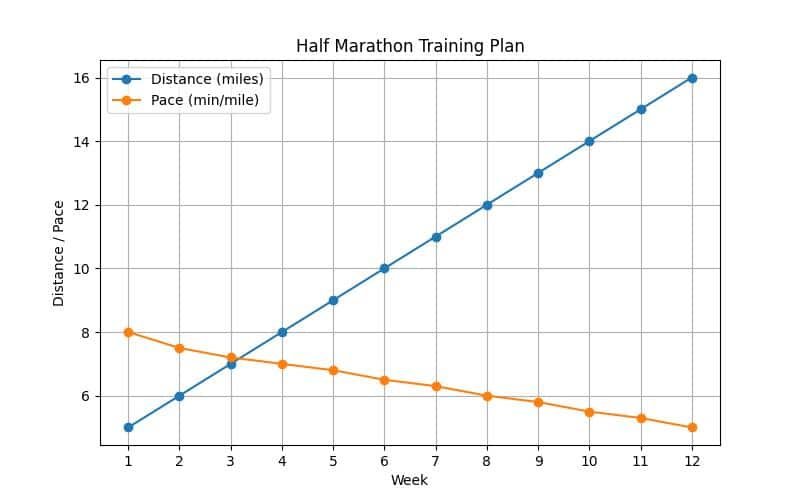Half Marathon Training for Beginners

Embarking on the journey to run a half marathon for the first time is a thrilling yet daunting endeavor. It’s not just about lacing up and hitting the pavement; it’s a comprehensive commitment that spans several weeks, testing both physical stamina and mental fortitude. As a beginner, understanding the essence of a structured training plan and aligning it with personalized tips can make the difference between merely finishing and thriving during your half marathon experience. This guide is not just another training schedule; it’s a testament to the transformative journey of half marathon training, infused with personal anecdotes, expert insights, and a touch of humor to keep you motivated.
What You’ll Learn
By reading this article, you will learn:
– The half marathon training schedule for beginners
– Essential tips for half marathon training
– Answers to common half marathon training FAQs
Half Marathon Training Schedule
Training for a half marathon requires a meticulous approach to gradually increase mileage while preventing injury. A typical half marathon training schedule spans 12 to 16 weeks and includes a mix of easy runs, long runs, speed work, and rest days. However, it’s not just about the runs. Incorporating strength training, cross-training, and adequate recovery are equally pivotal.

Insider Tip: Start your training with a buffer week, allowing for life’s unpredictabilities. If you miss a run due to unforeseen circumstances, you won’t have to play catch-up.
Half Marathon Training Tips
1. Start with a 5K
Before you set your sights on the half marathon, dipping your toes with a 5K race can offer invaluable insights into the racing environment and your personal pacing. My first 5K was a revelation, teaching me more about my running style and how I handle the pressures of race day than any training run ever did.
2. Run three times per week
Consistency is key, but so is balance. Running three times a week offers a solid foundation, allowing for ample recovery and the integration of cross-training to build strength and flexibility. This approach helped me avoid burnout and injuries, proving to be a sustainable routine throughout my training.
3. Run your easy runs at a conversational pace
The temptation to push the pace on every run is real, but the benefits of easy runs cannot be overstated. Running at a conversational pace has been a cornerstone of my training, ensuring I could recover adequately and actually enjoy the process without constantly gasping for breath.
4. Take walk breaks
Integrating walk breaks into your long runs is not a sign of weakness; it’s a strategic method to build endurance and manage fatigue. During my first half marathon training, walk breaks were crucial in extending my longest run each week, eventually leading me to complete the distance comfortably on race day.
5. Strength train
Strength training twice a week transformed my running form and efficiency, reducing my injury risk. Focusing on core, glutes, and leg strength has not only improved my running economy but also allowed me to tackle hills and late-race fatigue with confidence.
6. Cross-train
Incorporating activities like cycling, swimming, or even yoga can enhance your cardiovascular fitness while giving your running muscles a much-needed break. Cross-training became my secret weapon, offering mental and physical relief from the monotony of running, while keeping my fitness on an upward trajectory.
7. Rest and recover
Rest days are not optional; they are an integral part of your training. Embracing rest allowed my body to recover from the rigors of training, reducing the risk of overuse injuries. Remember, rest days are when the magic of muscle repair and strengthening happens.
Half Marathon Training FAQs
How long does it take to train for a half marathon?
The ideal training period is 12 to 16 weeks, assuming a base level of fitness. This timeframe allows for gradual mileage increase, minimizing the risk of injury.
Learn more about the ideal training duration for a half marathon
What is the best half marathon training plan?
The best training plan is one that fits into your lifestyle, acknowledges your fitness level, and respects your body’s need for recovery. Customization is key.
How many miles should I run to train for a half marathon?
Weekly mileage can vary widely, but aiming for 20 to 30 miles per week during the peak of your training is a reasonable target for beginners.
What should I eat during half marathon training?
A balanced diet rich in carbohydrates, proteins, fats, and hydration supports energy levels and recovery. Experimenting with nutrition during training runs is essential to avoid race-day gastrointestinal surprises.
Personal Half Marathon Training Journey
When I decided to train for my first half marathon, I was unsure of where to start. I followed a 12-week training schedule that gradually increased my mileage each week. I found it helpful to start with a 5K and gradually build up to longer runs. Running three times per week, including one long run, was key for building my endurance.
I also learned the importance of running at a conversational pace during my easy runs and incorporating walk breaks, especially during the longer runs. Strength training and cross-training helped prevent injuries and improve my overall fitness. Additionally, I made sure to prioritize rest and recovery, which was crucial for my progress.
Throughout my training, I encountered common questions and challenges, but with dedication and the right approach, I successfully completed my first half marathon. This personal journey taught me the value of consistency, patience, and proper training techniques.
More Half Marathon Training Tips
The journey to completing a half marathon extends beyond the miles. It’s about discovering what you’re made of, embracing the discomfort, and reveling in the unparalleled sense of achievement as you cross the finish line. Throughout my training, I’ve learned that flexibility, patience, and a sense of humor are just as important as any workout.
Insider Tip: Celebrate every milestone, no matter how small. Each step forward is a victory in the marathon journey of life.
In conclusion, training for a half marathon as a beginner is an adventure filled with highs and lows. But with a comprehensive training schedule, personalized tips, and an open heart, it’s an endeavor that can transform you in ways you never imagined. Embrace the journey, for the finish line is just the beginning of a new chapter in your running story.








